一般疑问句和否定句
小学英语四种基本句型-肯定句、否定句、一般疑问句与特殊疑问句
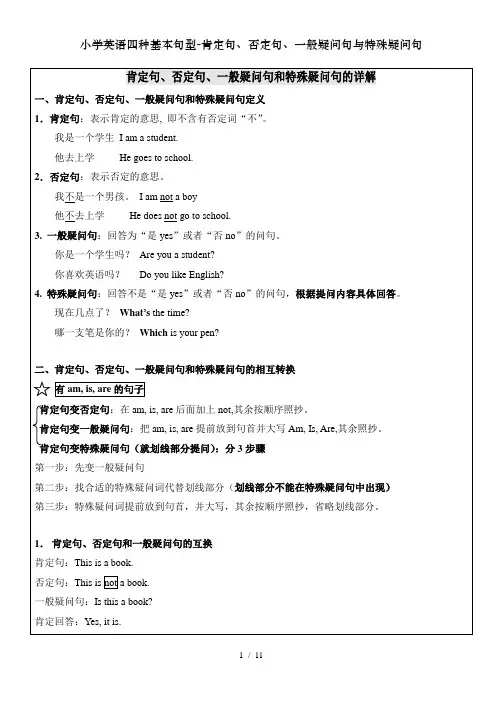
3 / 11
小学英语四种基本句型-肯定句、否定句、一般疑问句与特殊疑问句 特殊:
1.some 变为 any There are some birds in the tree.→There aren't any birds in the tree. 但是,若在表示请邀请、请求的句子中,some 可以不变。 Would you like some orange juice? 与此相关的一些不定代词如 something, somebody 等也要进行相应变化。
2.就划线部分提问(变特殊疑问句) I like English. 第一步:先变一般疑问句 Do you like English? 第二步:找合适的特殊疑问词代替划线部分 Do you like what? 第三步:特殊疑问词提前放到句首,并大写,其余按顺序照抄,省略划线部分。 What do you like?
类别 陈述句
疑问句
用法
标点
肯定 叙述一件事情或 说明说话人的看法 .
否定
一般 用于提出问题
?
特殊 用于提出问题
?
例句 This is a bag. That's my book. I can see a bag over there. I don't know. Are you a student? Do you like puppets? Can you speak English? What's your name? Where's my bag? How many trees are there?
1. 肯定句、否定句和一般疑问句的互换 肯定句:This is a book. 否定句:This is not a book. 一般疑问句:Is this a book? 肯定回答:Yes, it is.
否定句及一般疑问句
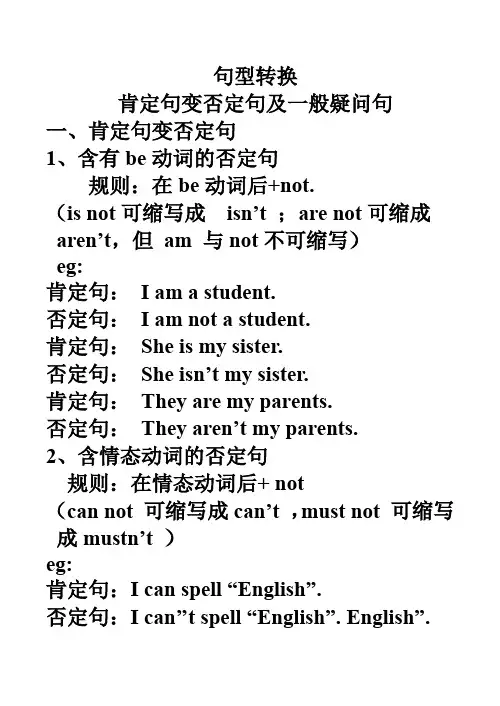
句型转换肯定句变否定句及一般疑问句一、肯定句变否定句1、含有be动词的否定句规则:在be动词后+not.(is not可缩写成isn’t ;are not可缩成aren’t,但am 与not不可缩写)eg:肯定句:I am a student.否定句:I am not a student.肯定句:She is my sister.否定句:She isn’t my sister.肯定句:They are my parents.否定句:They aren’t my parents.2、含情态动词的否定句规则:在情态动词后+ not(can not 可缩写成can’t ,must not 可缩写成mustn’t )eg:肯定句:I can spell “English”.否定句:I can’’t spell “English”.English”.肯定句:I must find it.否定句:I mustn’t find it.3、含有实义动词的句子的否定句构成(1)第三人称单数做主语。
(he、she、it或表示单个人或物的第三人称名词)规则:要在行为动词前加上助动词doesn’t,然后将动词恢复原形。
eg :肯定句:He has a soccer ball.否定句:He doesn’t have a soccer ball.(2)其它人称做主语规则:在行为动词前加don’t ,句子中的行为动词用原形。
eg:肯定句:They like bananas.否定句:They don’t like bananas.注:(1)在变否定句时,如遇some应变any Here are some books.Here aren’t any books.二、肯定句变一般疑问句1、含有be动词的句子变一般疑问句规则:把be动词提至句首,第一人称变第二人称,句末句号变问号。
(I/we变成youMy/our变成your)肯定句:I am a student.一般疑问句:Are you a student?肯定句:She is my sister.一般疑问句:Is she your sister?肯定句:They are my parents.一般疑问句:Are they your parents?2、含有情态动词的句子变一般疑问句规则:把情态动词提至句首,第一人称变第二人称,句末句号变问号。
怎样变一般疑问句、否定句和特殊疑问句
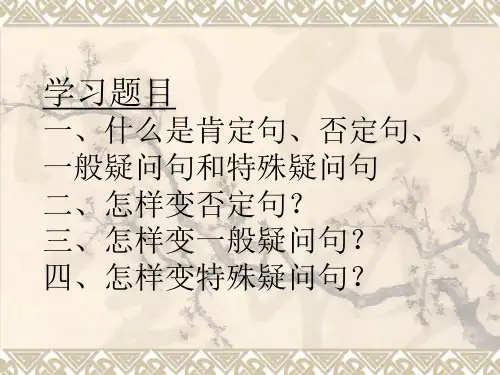
二、怎样变否定句
有am,
is, are的句子, 肯定句变否定句:在am, is, are后面加上not,其 余按顺序照抄。 例如:I am a boy. I am not a boy. He is a teacher. He is not a teacher. They are friends. They are not friends. 他们是朋友。 他们不是朋友。
学习题目
一、什么是肯定句、否定句、 一般疑问句和特殊疑问句 二、怎样变否定句? 三、怎样变一般疑问句? 四、怎样变特殊疑问句?
一、be动词:am,
is, are 二、肯定句、否定句、一般疑问句和特殊 疑问句定义 1.肯定句:表示肯定的意思, 即不含有否 定词“不”。 比如:我是一个学生 I am a student. 他是一个老师。He is a teacher. 2.否定句:表示否定的意思。 比如:我不是一个男孩。 I am not a boy 他不是一个老师。 He is not a teacher.
一般疑问句:回答为“是yes”或者“否no” 的问句。 比如:你是一个学生吗? Are you a student? Yes, I am./No, I am not. 4. 特殊疑问句:回答不是“是yes”或者“否 no”的问句,而是根据提问内容具体回答。 比如:这是什么? What’s this? It is a map.
四、怎样变特殊疑问句?
就划线部分提问(变特殊疑问句)
This
is a book. 第一步:变一般疑问句 Is this a book? 第二步:找合适的特殊疑问词 Is this what ? 第三步:特殊疑问词提前放到句首,并大写, 其余按顺序照抄,省略划线部分。得出正确 答案:What is this?
小学英语四种基本句型-肯定句、否定句、一般疑问句与特殊疑问句
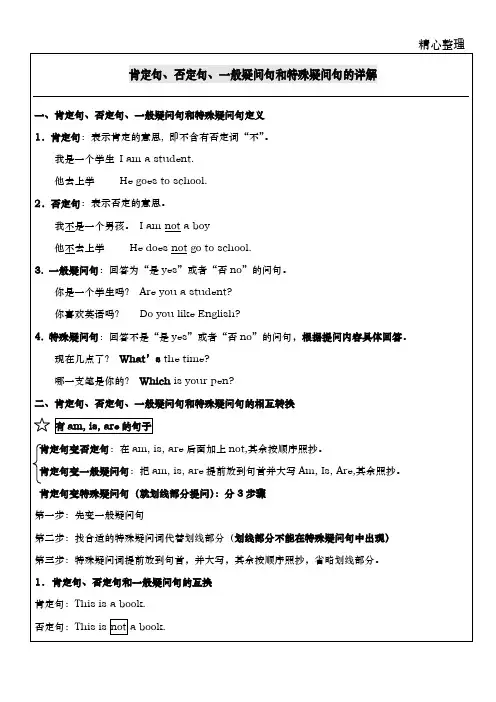
精心整理
一般疑问句:Is this a book? 肯定回答:Yes, it is. 否定回答:No, it isn’t. 2. 就划线部分提问(变特殊疑问句) This is a book. 第一步:变一般疑问句 Is this a book? 第二步:找合适的特殊疑问词 Is this what ? 第三步:特殊疑问词提前放到句首,并大写,其余按顺序照抄,省略划线部分。What is this?
肯定句、否定句、一般疑问句和特殊疑问句的详解
精心整理
一、肯定句、否定句、一般疑问句和特殊疑问句定义 1.肯定句:表示肯定的意思, 即不含有否定词“不”。
我是一个学生 I am a student. 他去上学 He goes to school. 2.否定句:表示否定的意思。 我不是一个男孩。 I am not a boy 他不去上学 He does not go to school. 3. 一般疑问句:回答为“是 yes”或者“否 no”的问句。 你是一个学生吗? Are you a student? 你喜欢英语吗? Do you like English? 4. 特殊疑问句:回答不是“是 yes”或者“否 no”的问句,根据提问内容具体回答。 现在几点了? What’s the time? 哪一支笔是你的? Which is your pen? 二、肯定句、否定句、一般疑问句和特殊疑问句的相互转换 有 am, is, are 的句子 肯定句变否定句:在 am, is, are 后面加上 not,其余按顺序照抄。 肯定句变一般疑问句:把 am, is, are 提前放到句首并大写 Am, Is, Are,其余照抄。 肯定句变特殊疑问句(就划线部分提问):分 3 步骤 第一步:先变一般疑问句 第二步:找合适的特殊疑问词代替划线部分(划线部分不能在特殊疑问句中出现) 第三步:特殊疑问词提前放到句首,并大写,其余按顺序照抄,省略划线部分。 1. 肯定句、否定句和一般疑问句的互换 肯定句:This is a book. 否定句:This is not a book.
一般现在时的构成、否定句、一般疑问句的构成
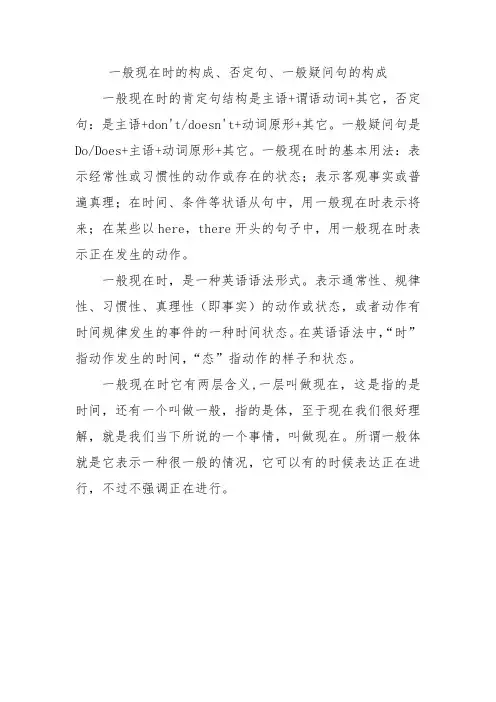
一般现在时的构成、否定句、一般疑问句的构成
一般现在时的肯定句结构是主语+谓语动词+其它,否定句:是主语+don't/doesn't+动词原形+其它。
一般疑问句是Do/Does+主语+动词原形+其它。
一般现在时的基本用法:表示经常性或习惯性的动作或存在的状态;表示客观事实或普遍真理;在时间、条件等状语从句中,用一般现在时表示将来;在某些以here,there开头的句子中,用一般现在时表示正在发生的动作。
一般现在时,是一种英语语法形式。
表示通常性、规律性、习惯性、真理性(即事实)的动作或状态,或者动作有时间规律发生的事件的一种时间状态。
在英语语法中,“时”指动作发生的时间,“态”指动作的样子和状态。
一般现在时它有两层含义,一层叫做现在,这是指的是时间,还有一个叫做一般,指的是体,至于现在我们很好理解,就是我们当下所说的一个事情,叫做现在。
所谓一般体就是它表示一种很一般的情况,它可以有的时候表达正在进行,不过不强调正在进行。
疑问句和否定句的构成及用法
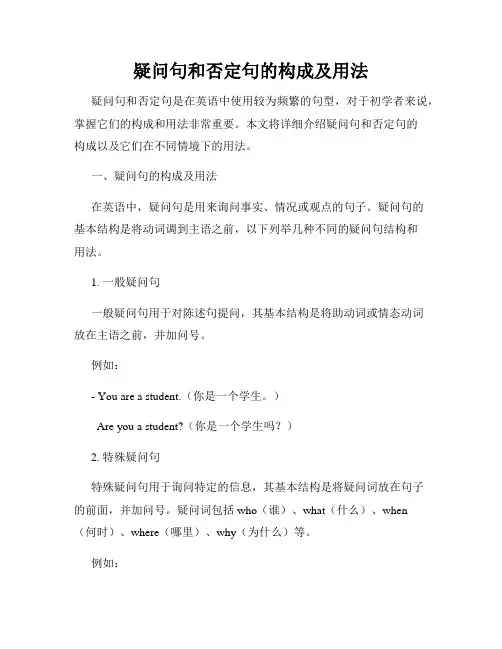
疑问句和否定句的构成及用法疑问句和否定句是在英语中使用较为频繁的句型,对于初学者来说,掌握它们的构成和用法非常重要。
本文将详细介绍疑问句和否定句的构成以及它们在不同情境下的用法。
一、疑问句的构成及用法在英语中,疑问句是用来询问事实、情况或观点的句子。
疑问句的基本结构是将动词调到主语之前,以下列举几种不同的疑问句结构和用法。
1. 一般疑问句一般疑问句用于对陈述句提问,其基本结构是将助动词或情态动词放在主语之前,并加问号。
例如:- You are a student.(你是一个学生。
)Are you a student?(你是一个学生吗?)2. 特殊疑问句特殊疑问句用于询问特定的信息,其基本结构是将疑问词放在句子的前面,并加问号。
疑问词包括who(谁)、what(什么)、when(何时)、where(哪里)、why(为什么)等。
例如:- Mary is reading a book.(玛丽正在读一本书。
)What is Mary doing?(玛丽在做什么?)3. 带有或不带有助动词的特殊疑问句在特殊疑问句中,有时候也可以不使用助动词,而是用一般疑问句的结构。
例如:- They have finished their homework.(他们完成了作业。
)Have they finished their homework?(他们完成了作业吗?)Finished their homework?(他们完成了作业吗?)4. 双重疑问句双重疑问句是由两个疑问词组成的疑问句,用于询问两个问题。
例如:- Who gave you the book?(谁给了你这本书?)When and where did you receive it?(你是什么时候和哪里拿到的?)二、否定句的构成及用法否定句是对肯定的陈述句加以否定的句子。
否定句的构成主要是通过在动词前加上否定词。
以下是几种常见的否定句结构和用法。
1. 否定词not的使用在一般肯定句中,我们可以通过在动词前加上not来构成否定句。
一般疑问句及否定句
一、含有情态动词的一般疑问句的变法。
直接把情态动词提前到句首,并大写第一个字母,然后照抄句子剩余部分。
如:can,could,will,would,shall,should---例句:I can say my ABCs.--- Can I say my ABCs? ---Can you say my ABCs?He can play basketball.--- Can he play basketball?He will go to school tomorrow.—Will he go to school tomorrow?二、含有be(is/am/are)动词的一般疑问句的变法。
直接把is/am/are提前句首,大写第一个字母,然后照抄句子剩余部分。
例句:He is a boy. --- Is he a boy?We are students.---Are we students?/Are you students?三、含有情态动词的否定句的变法。
直接在情态动词后面加not,即情态动词+not,然后照抄句子其余部分。
例句:I can say my ABCs.--- I can not /can’t say my ABCs.He can play basketball.--- Can he play basketball?He will go to school tomorrow. ---Will he go to school tomorrow?四、含有be(is/am/are)动词的否定句的变法。
直接在is/am/are后加not, 即is/am/are+ not,然后照抄句子其余部分。
例句:He is a boy.--- He isn’t/is not a boy.They are students. They aren’t /are not students.请把下面句子变成一般疑问句。
小学六年级英语语法知识点:一般疑问句、否定句
【导语】学习⼀些基本的英语语法,对于快速掌握英语语⾔的规律,具有事半功倍的作⽤,尤其是对于⼀些为考试⽽编的语法题句的理解,很有作⽤。
以下是整理的《⼩学六年级英语语法知识点:⼀般疑问句、否定句》,希望帮助到您。
【⼀般疑问句】 如何将⼀个肯定的陈述句改为否定句: 1、看句中有⽆be动词,如有,把be动词提到句⾸即可。
2、看句中有⽆情态动词,如有,把情态动词提到句⾸即可。
3、如上述⼆者都没有,就应把助动提到句⾸。
分四个步骤: (1)肯定陈述句中本来是没有助动词的,要加上去,位置在主语(某⼈或某物)后,动词前。
(2)确定助动词⽤do、does还是did,根据句中动词,动词是原形的助动词就⽤do,动词是第三⼈称单数的助动词就⽤does,动词⽤过去式的助动词就有did。
(3)把助动词后提到句⾸。
(4)原句中动词假如发⽣变化就要恢复成原形。
强调⼀点,有some的要考虑是否要⽤any。
【否定句】 否定句: be动词(am、is、are、was、were)+not、情态动词(can、must、should)+not、助动词(do、does、did)+not如何将⼀个肯定的陈述句改为否定句: 1、看句中有⽆be动词,如有,直接在be动词后+not。
2、看句中有⽆情态动词,如有,直接在情态动词后+not。
3、如上述⼆者都没有,就应⽤助动词+not。
分四个步骤: (1)肯定陈述句中本 来是没有助动词的,要加上去,位置在主语(某⼈或某物)后,动词前。
(2)确定助动词⽤do、does还是did,根据句中动词,动词是原形的助动词就⽤do,动词是第三⼈称单数的助动词就⽤does,动词⽤过去式的助动词就有did。
(3)在助动词后加not。
(4)原句中动词假如发⽣变化就要恢复成原形。
强调⼀点,有some的要考虑是否要⽤any。
一般疑问句和否定句讲解和练习题
一般疑问句的结构:1.当句子中有be动词时,:Be +主语+其它Are you a student-Yes. I am. / No, I'm not.I am a girl.He is cute.They are always late for school. Your father is a doctor.2.当句子中没有be ,只有动词:Do Does +主语+动词原形+其它;如:- Do you often play football- Yes, I do. / No, I don't.当主语为第三人称单数时,要用does构成一般疑问句;如:- Does she go to work by bike- Yes, she does. / No, she doesn't.He often goes to school by bus.They like to go to the zoo.She always goes home late.否定句的结构1.当句子中有be的时候:主语 + be + not+ 其他I am not a boy.She is not a girl.They are my friends.He is my brother.2.当句子中没有be,有动词的时候:主语+ don't doesn't +动词原形+其它;I don't like bread.当主语为第三人称单数时,要用doesn't构成否定句;He doesn't often play.I eat meat.You play chess.She always does the housework on Sunday.The dog plays with its tail all the day.一、用所给动词的一般现在时填空;1. We often play in the playgrounnd.2 you brush your teeth every morning3. What do he usually do after school4. Danny study English, Chinese, Maths, Science, and Art an school.5. Mike sometimes go to the park with his sister.6. At eight at night, she watch TV with his family.7. Mike read English every day8. How many lessons your classmate have on Monday9. What time his mother do the housework二、按要求改写句子;1Do you often play football after school 改为肯定句2I have some books. 改为否定句3Gao Shan’s sister likes playing table tennis. 改为否定句4She lives in a small town near New York. 改为一般疑问句5I watch TV every day. 改为一般疑问句6We have four lessons. 改为否定句7Nancy doesn’t run fast. 改为肯定句三、单项选择;1. you have a bookA. DoB. AreC. IsD. Have2. They on a farm.A. workingB. is workC. workD. is worked3. Does Peter like to watch TV .A. Yes, he likeB. No, he doesn’tC. Yes, he’d likeD. No, he likes4. She doesn’t her homework in the afternoon.A. doingB. to doC. doesD. do5. Where’s my camera I it.A.am not findingB. am not seeingC. can’t findD. can’t lookat6. you usually late for school No, .A. Do, I amB. Does, notC. Are, I’m notD. Are, I aren’t7. she home at six every dayA. Is, leaveB. Does, leaveC. Is, leavesD. Does, left8. Mr. Yang English this term.A. teaches ourB. teaches usC. teachs usD. teach ourI have 3 new teachers. They are my English teacher, my teacher and my Chinese teacher. Miss zhao is pretty and active. She's a universitystudent. She's our English teacher. My teacher is Mr. Chen. He's tall and strong, and he's strict, too. Miss Sun is my Chinese teacher. She's quiet. She has long hair and big eyes.1. I have new teachers. A. twoB. threeC. four2. Miss Zhao is myteacher. A. EnglishB. ChineseC. PE3. Mr. Chen is . A. tall B. strong C. tall and strong4. Is my teacher strictA. Yes, she is B. Yes, he is C. No, he isn't5. Miss Sun is . A. quiet B. active C. strict。
(完整版)小学英语四种基本句型肯定句否定句、一般疑问句与特殊疑问句
一、肯定句、否定句、一般疑问句和特殊疑问句定义 1.肯定句:表示肯定的意思, 即不含有否定词“不”。
我是一个学生 I am a student. 他去上学 He goes to school. 2.否定句:表示否定的意思。 我不是一个男孩。 I am not a boy 他不去上学 He does not go to school. 3. 一般疑问句:回答为“是 yes”或者“否 no”的问句。 你是一个学生吗? Are you a student? 你喜欢英语吗? Do you like English? 4. 特殊疑问句:回答不是“是 yes”或者“否 no”的问句,根据提问内容具体回答。 现在几点了? What’s the time? 哪一支笔是你的? Which is your pen? 二、肯定句、否定句、一般疑问句和特殊疑问句的相互转换 有 am, is, are 的句子 肯定句变否定句:在 am, is, are 后面加上 not,其余按顺序照抄。 肯定句变一般疑问句:把 am, is, are 提前放到句首并大写 Am, Is, Are,其余照抄。 肯定句变特殊疑问句(就划线部分提问):分 3 步骤 第一步:先变一般疑问句 第二步:找合适的特殊疑问词代替划线部分(划线部分不能在特殊疑问句中出现) 第三步:特殊疑问词提前放到句首,并大写,其余按顺序照抄,省略划线部分。 1. 肯定句、否定句和一般疑问句的互换 肯定句:This is a book. 否定句:This is not a book. 一般疑问句:Is this a book? 肯定回答:Yes, it is. 否定回答:No, it isn’t. 2. 就划线部分提问(变特殊疑问句) This is a book.
- 1、下载文档前请自行甄别文档内容的完整性,平台不提供额外的编辑、内容补充、找答案等附加服务。
- 2、"仅部分预览"的文档,不可在线预览部分如存在完整性等问题,可反馈申请退款(可完整预览的文档不适用该条件!)。
- 3、如文档侵犯您的权益,请联系客服反馈,我们会尽快为您处理(人工客服工作时间:9:00-18:30)。
亠般疑问句,否定句重点:辨别一般疑问句,掌握一般疑问句语法结构和使用方法。
难点:1.一般疑问句的句子结构。
2. —般疑问句和陈述句之间的转化。
动词时态的变化。
教具准备:教学讲义练习题。
教学过程:1. 复习:P17,P32重新朗读课文。
复习单词和语法。
2. 提出课题:Does.. .l ike...(do in g)?Yes,...does./No,...doesn ' t.Is/Are...(doi ng )?Yes,...is/are./No,...isn ' t/aren ' t.由以上例句总结一下一般疑问句的定义 :一般疑问句是疑问句的一种。
它是一般只用 (是)或no (否)来回答的句子。
朗读一般疑问句时用升调。
3. 教学步骤: a.举出更多例句课题一:一般疑问句 general questionyesEg1. 问句:Is this your pen ?肯答: Yes,it is.否答: No,it is n't.Eg2. 问句:Are these your books ?肯答: Yes,they are.否答: No,they aren ' t.Eg3. 问句:Can you speak En glish?肯答: Yes,I can.否答: No,I can ' t.Eg4. 问句:Do you like apple ?肯答: Yes,I do.否答: No,I don ' t.b.总结一下一般疑问的句子结构及回答。
(句子结构的记忆方法:位置了。
)ls/Are+ 主语+其他部分?。
是。
?Eg1. Is this your pen ?就是讲前面2个词调换当只有一支笔的时候就用Is,回答:Yes,it is/No,it isn ' t .当有两只及以上用时用Are,而且要讲这个(this )/那个(that )变为这些些(those).笔要加s变成复数。
女口:Are these/those your pens?(these)/ 那Can/Will+主语+V-原型?(后面动词都用原型)Eg. You can ope n the door Can you ope n the door?You will go to school next Mon day Will you go to school n ext Mon dayDo/Does+ 主语+V-原型?Eg. Do you like apple ?Does Mary like cat?第一,二人称(l,You )用Do;第三人称(Mary )用DoesParents 等复数也用Do.举例:我需要现在回家吗? Do i need to go home now? 回答:你父母喜欢英语吗? Do your pare nts like En glish?Alice 喜欢花吗? Does Alice like flower ?C. 辨别以下是否为一般疑问句。
Are you a stude nt?Is it his pet?What is that over there?回答: Yes,they are/No,they aren t .Can you swim?Do you have a storybook?This is a toy bear,l think.D.将陈述句转化为一般疑问句。
句子中有ls/Are/can:(some 改成any , my 改成your 等)一加:把句中的Is/Are/ca n.到主语前;二改:改换主语称谓,即将句中的主语l\my\mine\we\our\ours 等第一人称分别改为相应的第二人称you\your\ yours 等;三问号:句末的句号改为问号。
如:Eg6. I am an English teacher. Are you an English teacher?Eg7. We can speak English fluently. Can you speak English fluently?句子中没有Is/Are/can (some 改成any , my 改成your 等)一加:即在句首加助动词Do或Does ;二改:1、把谓语动词改为原形;2、改换主语称谓(同);三问号:句末的句号改为问号。
Eg8. We read En glish every morni ng. T Do you read English every morning?Eg9. Tom ' s father listens to English on the radio every evening.Does Tom ' s father listen to English on the radio every evening?特别注意:对于第一定要注意动词的还原,因为时态与数的变化已经体现在助动词上了。
E.将下面的句子转换为一般疑问句。
1.1am from china. Are you from china?2.This is my sister ,Na ncy. Is this your sister,Na ncy?3.You can have a look. Can I have a look?4.1play football. Do you play football?5.Kitty has a yellow purse. Does Kitty have a yellow Purse?6.There is a birthday cake on the table? Is there a birthday cake on the table?课题二:一般现在时否定句重点: 1 .掌握一般现在时否定句的基本构成方法。
2•了解一般现在时否定句的基本用法。
3•能灵活的运用一般现在时的否定句形式。
难点: 1.一般现在时否定句的构成,掌握行为动词一般现在时第三人称单数。
2.能灵活的运用一般现在时否定句。
教学过程:1.Be 动词的否定式:be+notEg:l am a teacher. I ‘ m not a teacher.You are a student. You aren ' t a student.She is a doctor. She isn ' t a docor.We are friends. We aren ' t friends..要求学生写出类似的句子。
如: I am a girl.2. Do/Does (实义动词)的否定句。
Do+not/Does+not. 第一人称(我/我们)、第二人称(你/你们Do第三人称(他/他们)T Does 改为否定句时,一定要记得讲句子中动词恢复原型。
Mary doesn ' t like playing the piano.play football 踢足球 play baseball 打棒球 play tennis 打网球 play table tenn eis 打乒乓球 Play badm inton 打羽毛球play the guitar 弹吉他 play the violi n 拉小提琴 Eg. I like En glishI don ' t like English.Mary likes playing the piano Play the drum 打鼓3•练习一下。
将词组或单词写成一个完整的句子,并改为否定句。
My mother read books every morning. Lily sing song every ni ghtPlay basketball Tom like on weeke ndsAt the mid-auru mn eat we moon cakes 课结束前总结课堂讲义1.否定句:将词组或单词写成一个完整的句子,并改为否定句。
My mother read books every morni ng.Lily sing song every ni ghtPlay basketball Tom like on weeke ndsAt the mid-auru mn eat we moon cakes2.一般疑问句:辨别以下是否为一般疑问句。
Are you a stude nt?Is it his pet?What is that over there?Can you swim?Do you have a storybook?This is a toy bear,I thi nk.3.—般疑问句:将下面的句子转换为一般疑问句。
1.1am from china. Are you from china?2.This is my sister ,Na ncy. Is this your sister,Na ncy?3.You can have a look. Can I have a look?4.1play football. Do you play football?5.Kitty has a yellow purse. Does Kitty have a yellow Purse?6.There is a birthday cake on the table? Is there a birthday cake on the table?HOMEWORK般疑问句及否定句专项练习•请将下列句子改为一般疑问句,并作出回答。
1.1am a stude nt. ------------- a stude nt?2.She is a girl. ------------ a girl?3. ------------------------------------------------------------------- His first n ame is Tom. n ame Tom?4.This is a ruler. ------------ a ruler?6. There is a book on the desk. ------------------- a book on the desk?7.There are some dictionaries on the floor.----------------- dictionaries on the floor?10.My friend wants to know about my morning.to know about morning?12.Mr.White is very busy.14.She watches TV in the morni ng.15.1 watch TV in the eve ning.17.1 want to know his n ame.13.He teaches us art.us art? 18.They study at home.at home? 19.She studies En glish at school.En glish at school? 20.I do my homework every day. homework every day? 21.He does his homework at7:00pm. his homework at7:00pm? Mr.White very busy? TV in the morning? TV in the eve ning? 16.He runs every day.every day? to know his n ame?23.She eats chicken for dinner. ----------------------- chicken for dinner?24. ----------------------------------------------------------------------------- M y pare nts like eati ng banan as.------------------------------------------------------ parents -------------- banan as?25.We do eye exercises every day. ----------------------- eye exercises every day?26.He has a green T-shirt. ---------------------- a green T-shirt?27. ----------------------------------------------------------------------------- M y birthday is October 10th. October 10th?28. ---------------------------------------------------------------------------------------- Her favorite subject is scie nee. ---------------------------------------------------------- scie nee?29. ---------------------------------------------------------------- W e can see some birds. see birds?.请将下列句子改为否定句I.There is a computer on the desk. There -------------- a computer on the desk.2. There are some pictures on the wall. There pictures on the wall.4.I like pears. I --------- p ears.5.She has a soccer ball. She ---------------- a soccer ball.6.My mother wants to go to a movie. My mother7.Tom can play the drums. Tom --------------- play the drums.8.I can sing and dance. I ---------- sing——dance.9.She has some erasers. She ------------------------ erasers.10.1think it is interesting. I ------- it is interesting.11.Mary ofte n plays sports after dinner. Mary12.There are some tomatoes in the box. to go to a movie. sports after dinner.There are tomatoes in the box.14. She has brothers and sisters. She ------------------ b rothers——sisters.15. I think she is right. I --------- she——right.16.She gets up at 6:00 in the morning. She ------------------ up at 6:00 in the morning.。
